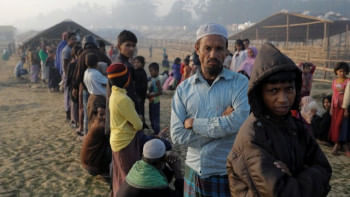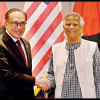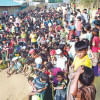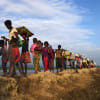Rohingya Repatriation: Waiting for Godot?

The situation in Myanmar's Rakhine state has tensed up again, with another incident of shootout between the military and the Arakan Army (AA) taking place recently. The military has been using mortars and launching airstrikes against the Arakan Army. The military choppers entered Bangladesh airspace several times, violating international laws. Hostilities across the border have raised new tension and pose a threat to the chances of repatriation of the Rohingya refugees in Bangladesh.
More than 1.1 million Rohingyas are living in 34 camps in Cox's Bazar at present. The country accommodated the displaced Rohingyas and took multiple initiatives to repatriate them to their homeland, Myanmar. At least two attempts for repatriation have failed since the latest influx in 2017. In August this year, observing five years of their exodus to Bangladesh, they reiterated the urgency of repatriation to their homeland. Before that, they arranged a campaign under the banner "Go Home" in the camps to draw the global communities' attention to take emergency steps to repatriate them with safety and dignity. During the then UN High Commissioner for Human Rights Michelle Bachelet's visit to the camps in August, they demanded UN's effective initiatives to improve the situation in their homeland and start the repatriation. In response to that, she only urged the Rohingyas to be patient.
Meanwhile, a newly elected government was overthrown by a military coup in February 2021. Later, a shadow government, formed in the name of National Unity Government (NUG), with its armed wing the People's Defence Force (PDF), started a movement against the military junta, building strong resistance against the military that turned violent. This escalation has made Rohingya repatriation even more uncertain, the refugees' wait increasingly threatening to turn into a modern-day rendition of Waiting for Godot.
The situation right now
The Rohingya refugees inhabit the hilly areas of the southern coastal region of Bangladesh. They have been living there with rudimentary facilities, no work, and little access to education. Being stuck in the overcrowded camps, their lives have become inhumane.
Over 80 percent of the refugees in Cox's Bazar rely on external aid to survive. Every family gets a monthly food ration of Tk 1,030 per person. Rohingyas repeatedly stressed that running a family with this allocation is very hard. On the other hand, the influx of refugees has put immense pressure on the host communities, and the environment in a densely populated country. The host communities in Cox's Bazar are also highly vulnerable and at high risk of hunger like the Rohingyas, according to a WFP report.

The population growth rate in the camps is alarming; Home Minister Asaduzzaman Khan Kamal said in April this year that some 35,000 babies are born in the Rohingya camps yearly. Little access to safe water, sufficient nutrition, and healthcare facilities are causing malnutrition and disease outbreaks. There is little scope for formal education for the Rohingya children – 75 percent of the children are deprived of formal education. The frustrated teenagers are growing up without skills and goals for their future, which makes them vulnerable to organised youth gangs and criminal activities.
The internal security in the camps is also at risk as several armed organisations' activities are intensifying gradually. Local police said that around 2,441 cases have been filed against the Rohingyas in the last five years, covering at least 14 types of criminal activities, including killings, drugs, human trafficking, abduction, theft, robbery, snatching, arms and rape. At least 109 people died in "gunfights" with security forces. Around 14-20 armed criminal groups are active in the camps in Ukhiya and Teknaf. As of August 2022, 115 murders have been reported in the last five years in internal conflicts among these gangs. In the last four months, at least 20 people were killed, most of them pro-repatriation leaders.
What's next?
The camp situation is deteriorating as most of the aid for the Rohingya camps comes from Western countries, who have turned their attention to the Russia-Ukraine war. Various global crises like the Covid pandemic, the Afghanistan crisis, and most recently the Russia-Ukraine war have exacerbated vulnerabilities and worsened the condition. Reports say only 43 percent of the required amount of USD 881 million under the Joint Response Plan 2022 has been funded in 2022. In 2021, the disbursed amount was 72 percent of the required USD 943 million.
New tensions in the Rakhine state poses a new threat to the Rohingya population. At least 20 Rohingya families fled to Bangladesh in September due to the ongoing clashes. According to the newly arrived people, about 1,000 Rohingyas are waiting to cross over on the other side of the border.
On October 20, Foreign Minister AK Abdul Momen said the current military government in Myanmar had agreed to take back Rohingyas after verification, but there is no specific timeframe for that. Previously, on June 14, Bangladesh handed over a list of 830,000 individuals containing biometric data, but the Myanmar authority has only verified 58,000. This implies that their motive is apparently to delay the process.
Addressing the United Nations General Assembly in September, Prime Minister Sheikh Hasina called upon the UN to play a strong and effective role to create a safe environment for repatriation. China and Russia are backing the junta military for their own political and economic interests. The UN Security Council also failed to come up with an effective solution to the Rohingya crisis, despite widespread global support for the persecuted people. Though the Western blocs raised their concerns and funded assistance for the refugees, they couldn't play an effective role that can facilitate repatriation. Lingering the process is making the Rohingyas ultimate sufferers.
As regional powers, India and Asean member states should collaborate with the afflicted nations as the crisis festers and gives rise to more radicalism, extremism, and cross-border crimes. The only solution is repatriating the Rohingyas to their own land. Therefore, the world must look onto effective measures and use all available tools to hold Myanmar accountable on repatriation.
Erina Haque is a human rights activist, refugee affairs researcher, and freelance columnist.

 For all latest news, follow The Daily Star's Google News channel.
For all latest news, follow The Daily Star's Google News channel. 










Comments